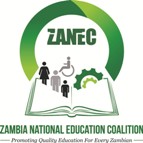
SMALL GRANTS TO STUDENTS IN INSTITUTIONS OF HIGHER LEARNING TO PROMOTE CRITICAL THINKING
- INTRODUCTION
The Zambia National Education Coalition (ZANEC) is a network of Civil Society Organisations registered under the Registrar of Societies Act on 3rd July, 2002 on certificate number ORS/102/35/2581. The organisation currently has sixty-six Member Organisations comprising of Community Based Organisations, Faith Based Organisations, Non-Governmental Organisations and Teacher Trade Unions.
The organization’s mandate is to coordinate civil society advocacy for quality, equitable and inclusive education for all Zambians. ZANEC’s focus is therefore on national plans and international frameworks that advance education in Zambia. Particularly, the Coalition takes interest in the provision of quality education services.
Zambia over the years has seen unprecedented growth in the number of students seeking higher education in public universities. This is evidenced from the growth in numbers of pubilc universitiies to approximately 9. Public universities are shrouded in high lecturer and student ratios, little or more so no money for research and development let alone resources for management and administrative support. The quality of learning in private institutions also remains a concern of the coalition. As such the intervention is targeted on both private and public organisations.
There is a huge push by government especially in public universities to ensure Institutions of Higher Learning are “conservative” and do not process any liberal views. As higlighted in the study on Academic Freedoms conducted by ZANEC in 2015, the observation is particularly unique to a country like Zambia under a multi-party dispensation, it is a common place to label a researcher, student and lecturer as ‘supporters’ of the opposition even when research evidence is reflective of the reality obtaining on the ground.
Institutions of Higher Learning like UNZA as a case in point have seen the design and implementation of their learning process change; where tutorials which are an individualized teaching/learning process intended to mentor, assess and broaden critical thinking outside the ordinary lecture room are phasing out due to large class sizes. The University Student Population stands at over 30, 000 as reported by the Public Relations and International Liaison Manager at University of Zambia and yet operating with the same infrastructure as when it was established in 1966 with a student population of 312. Programmes to expand existing infrastructure is not matched with the required resources. Institutions of Higher Learning are characterized by overcrowded lecture rooms in a bid to bridge its resource gap and finance the institution. This in turn significantly compromises the quality of learning needed for students to make any meaningful contribution to society. In addition, there are no deliberate policies or initiatives to ensure inclusivity is taken into consideration, in line with the country’s Seventh National Development Plan which states that “No one should be left behind”. The foregoing is a clear indication of how the increasing student population does not match staffing levels hence directly impacting on academic freedoms and quality of education received in Institutions of Higher Learning.
ZANEC through its advocacy work has noted with concern the continued declining teaching standards affecting Higher Institutions of Learning . The Coalition, with the funding from SAIH, envision to promote critical thinking by providing research grants to students. This call is the third round. The past two rounds have seen students research several topics such as Female Lecturers’ Participation in Higher Administrative Leadership Positions in Universities, Possible Effects of Abolishing Students Meal Allowances on University of Zambia Students’ Academic Achievements, Determinants of Programme Choices by students in Higher Institutions of Learning.
- PURPOSE OF RESEARCH
To proactively influence and strengthen the competence of students in research
- Specific objective:
- to promote critical thinking as an exercise of academic freedoms in institutions of higher learning
- SCOPE OF WORK
Successful applicants will be expected to conduct academic style research on various topics relating to, but not limited to, Academic Freedoms in Zambia, gender, decolonisation of Education and Equality. Preference will be given to research topics focused on female participation and inclusive societies.
- KEY DELIVERABLES
- Research proposal by students highlighting focus of research;
- Letter of commitment to be available for the entire 3 months research process.
- Timely submission of approved proposal and data
collection tool, first and second draft and final word and PDF version of
research reports.
- Participate in dissemination platforms of their research as agreed with ZANEC Secretariat.
- Complete research report – submission of research work.
- REQUIRED COMPETENCIES
- Must be a student at any institution of higher learning in Zambia.
- Must be second and third year student at the named institutions.
Female students and students from Private Institutions are encouraged to apply.
The Executive Director,
Zambia National Education Coalition,
Baptist Fellowship Building,
Plot 3061/2 Corner Makishi and Great East Road,
P.O. Box 30774,
Lusaka-Zambia,
Email: admin@zanec.org.zm
*Any application sent in without a proposal and commitment letter will not be processed.
Find Us on Social Media